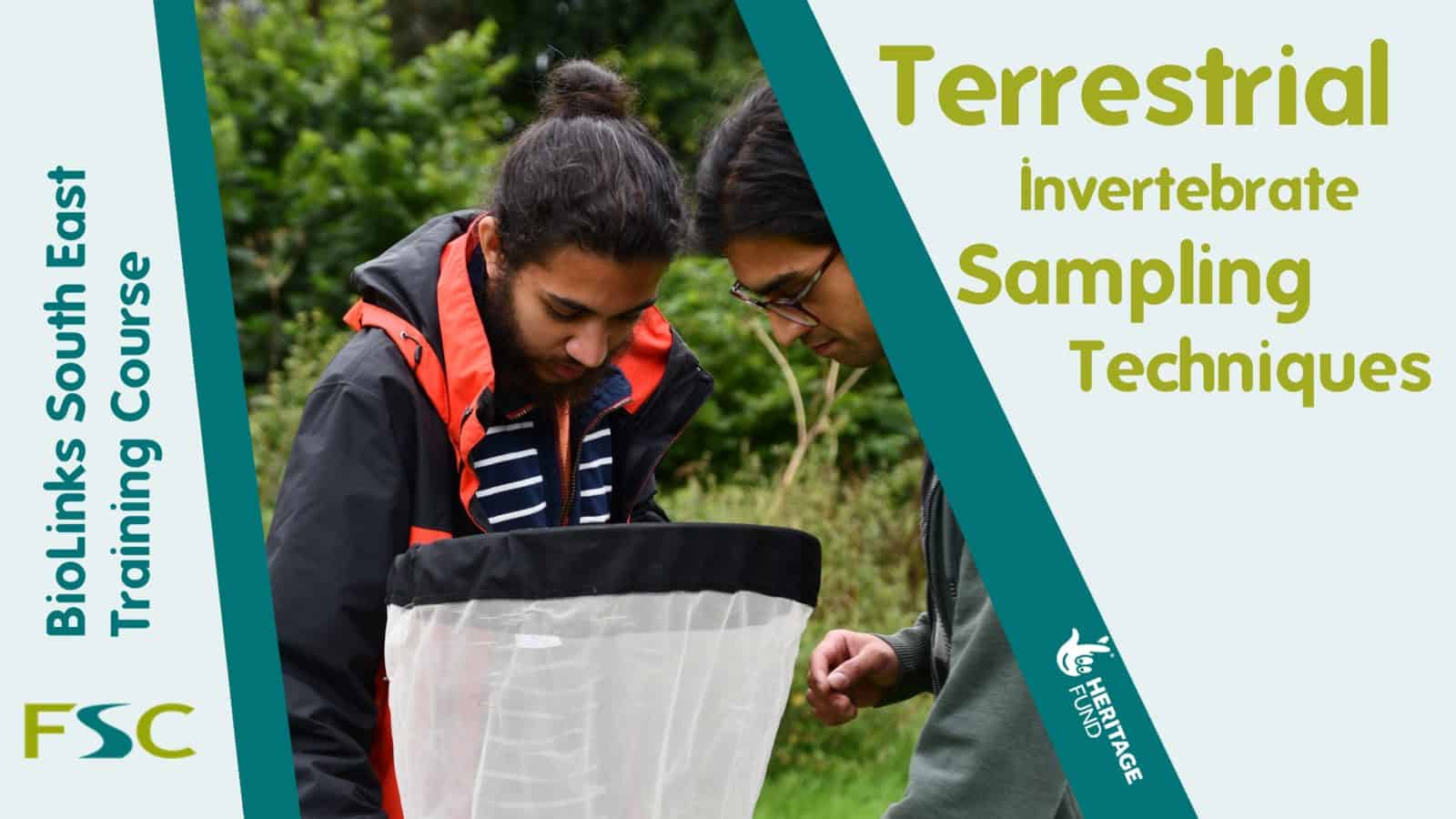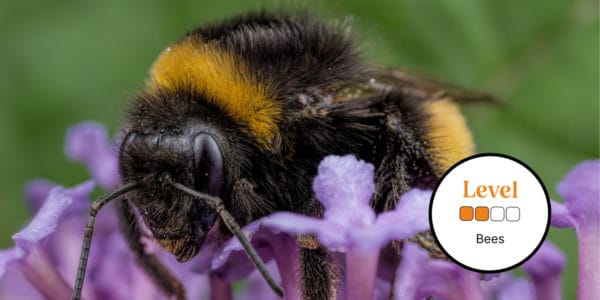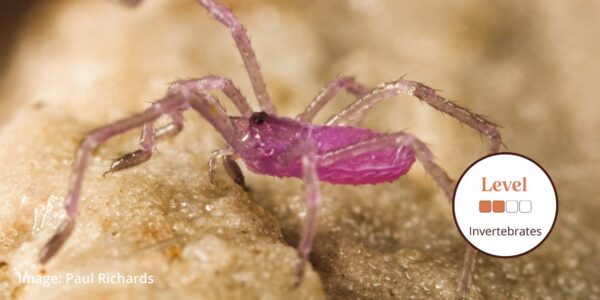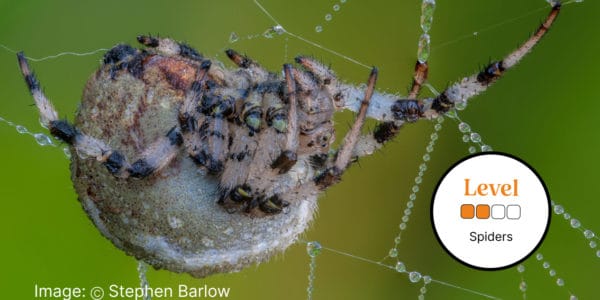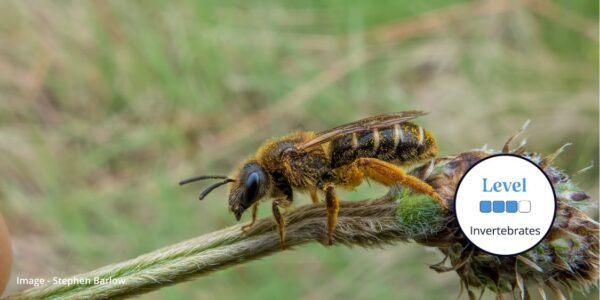This course will provide training in a variety of entomological techniques in collecting and sampling terrestrial invertebrates in the field. We will use a variety of techniques to collect specimens which will be preserved on the day for identification at subsequent one-day courses that lead on from this course: Identifying Terrestrial Invertebrates with Microscopes and Creating and Using an Insect Collection.
The course will start with a brief introduction to invertebrate collecting, why it is necessary, and how to collect responsibly. Most of the day will be spent outdoors where you will be taken through the appropriate methods involved in collecting different terrestrial invertebrate groups that we expect to find at this time of year (such as: flies, beetles, woodlice, slugs, snails, centipedes, millipedes, ants, springtails, and earthworms) from various microhabitats. We will focus on collecting invertebrates off trees and bushes; off grass and shrubs; as well as from the ground surface and in the soil. There will also be opportunities to use our equipment and to discuss other targeted sampling methods with our course team.
All records collected will be added to iRecord in order to share our findings with the site managers, Local Environmental Record Centre and relevant national recording schemes and societies.
This course is aimed at adults only and course attendees must be at least 18 years old in order to attend.
What will the day involve?
- A short presentation on why and how we collect invertebrates
- Practical experience in setting pitfall traps
- Training in the use of a sweep net and beating tray
- Sifting leaf litter and the use of a Berlese funnel
- Experience in settting baited traps
- Setting a flight intercepot trap (either malaise or vane trap)
- Digging soil pits and hand sorting
- Access to field equipment with support and guidance from a member of the FSC BioLinks project team
You must be at least 18 years old to be able to join us on the day.
You’ll have access to our tea and coffee making facilities but please bring your own lunch and any other refreshments you may require!
Please note that this event will involve individuals collecting, preserving and killing invertebrate specimens for identification purposes in order to assist us in generating a site species list.
Tutor: Gino Brignoli
Gino is an active invertebrate recorder in London’s green spaces, with a particular interest in the ecologies of urban insects.
He has worked as a freelance field surveyor on behalf of the Forestry Commission; researched ant ecology and evolution, and taught entomology field techniques whilst employed as a Research Assistant at Queen Mary University of London. With a keen interest in ecology and entomology, Gino studied an MSc in Ecology and Evolution from Queen Mary and a BSc in Biodiversity and Conservation from Birkbeck College, University of London.
He has also previously volunteered with the Lepidoptera department and Soil Biodiversity Group at the Natural History Museum, and on the Thorn to Orchid and Water for Wildlife projects with the London Wildlife Trust. He now coordinates the BioLinks courses in London.
Covid Measures
In order to keep our customers and staff safe we ask that anyone attending our centres:
- wears a face covering when in shared indoor space (unless exempt).
- maintains social distancing.
- cleans their hands regularly.
- takes a Covid-19 test before they arrive.
Example Timetable
- Please arrive in time for the course to start promptly at 10:00 am.
- Refreshments will be available from 9.45 am.
- The Field Recorder Day will end at 4:00 pm.
What's Included
- A short presentation on why and how we collect invertebrates
- Practical experience setting pitfall traps
- Training in the use of a sweep net and beating tray
- Sifting leaf litter and the use of a Tullgren funnel
- Digging soil pits and hand sorting
- A chance to meet fellow like-minded people from a range of different disciplines
- Access to field equipment with support and guidance from a member of the FSC BioLinks project team
Bursaries and Subsidies
FSC BioLinks
FSC BioLinks is an exciting project for FSC in the South East and West Midlands, bringing together existing volunteers with skills in biological recording and identification, and new volunteers.
This project provides subsidised training courses, learning opportunities and digital tools focussed on invertebrate identification for anyone involved or interested in biological recording, to build and strengthen the community.
Invertebrates provide us with many useful ecosystem services, like pollination and decomposition, which we cannot survive without but their numbers are declining. Few people know how to identify or record invertebrates meaning there is a lack of data.
We are delighted to have been awarded a grant of £1.23 million from the National Lottery Heritage Fund for this project.
Before You Attend
Getting to FSC London: Bushy Park
Information on getting to the site can be found here.
When you arrive at The Stockyard gate you may need to call the centre to open the gate. You can reach the staff on site on 020 8941 4398.
Due to the outside nature of part of this course, participants are advised to bring suitable clothing and footwear in order to access the Bushy Park site in various weather conditions.
What to bring
- Notebook and pencil
- Lunch
- Suitable clothing for the weather (warm clothing, waterproofs) and suitable footwear (walking boots or wellies)
- Any personal field equipment you have, such as a hand lens and pooter (equipment will be provided for those that need it).
Please note that this event will involve individuals collecting, preserving and killing invertebrate specimens for identification purposes in order to assist us in generating a site species list.
There will be a member of staff with first aid training and access to a first aid kit on site. If you have special medical requirements please let us know as soon as possible so we can plan the course.
Sorry this course has ended

